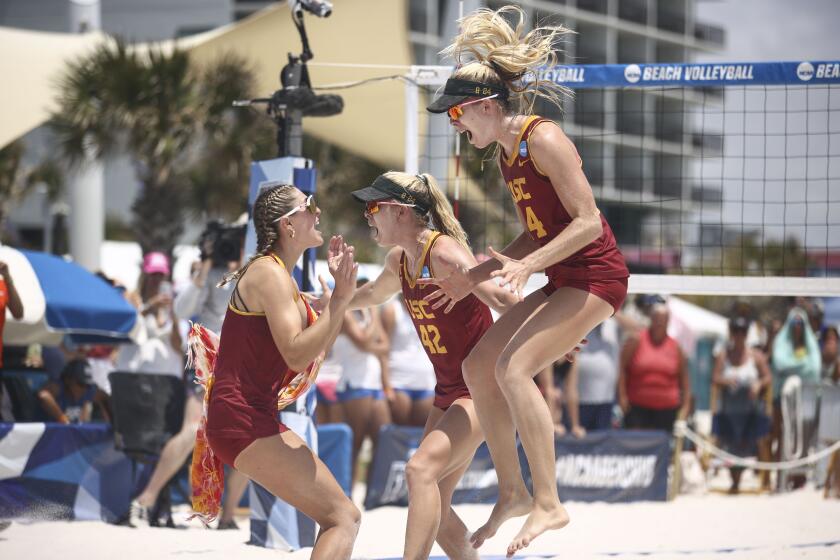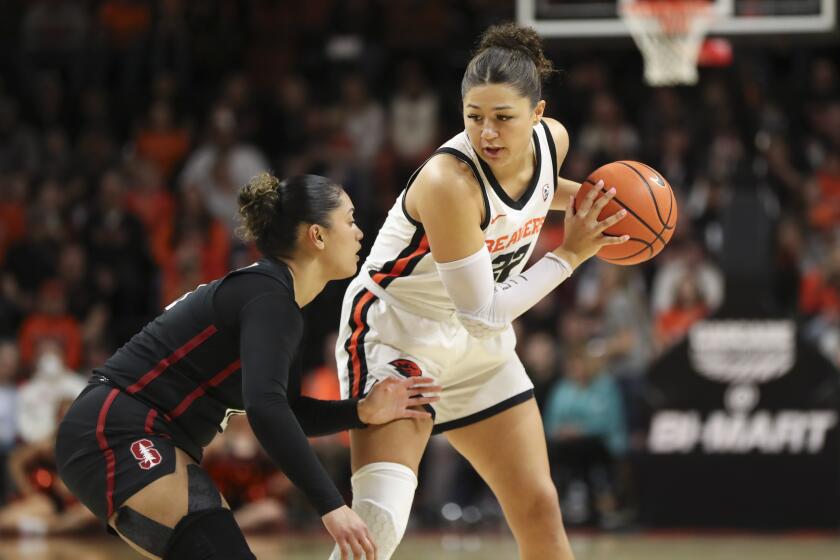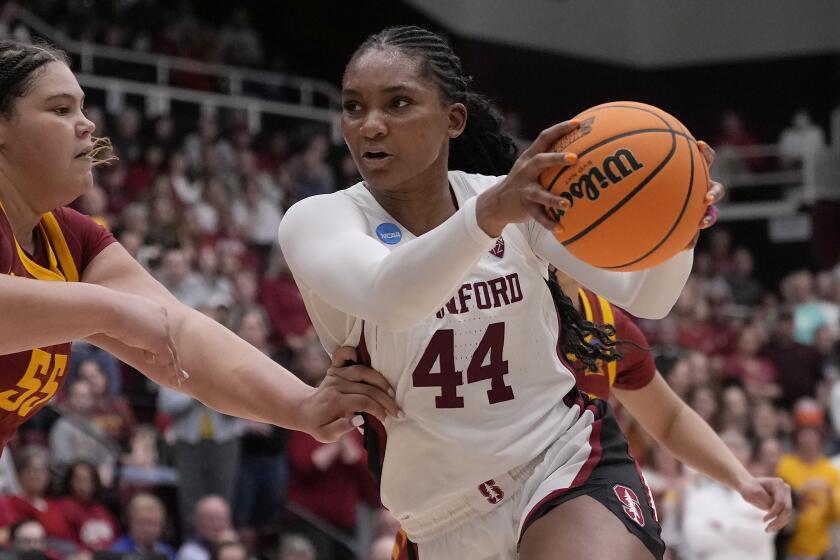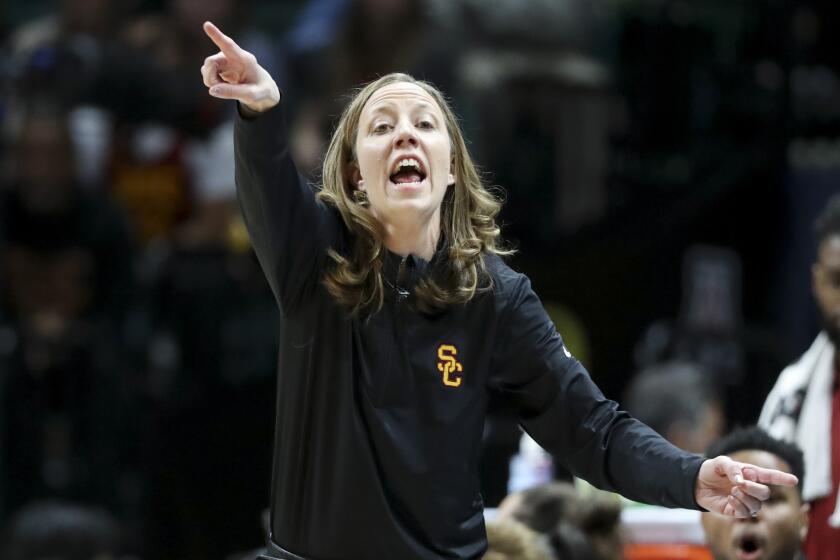USC puts forth a workmanlike effort in defeating Stanford
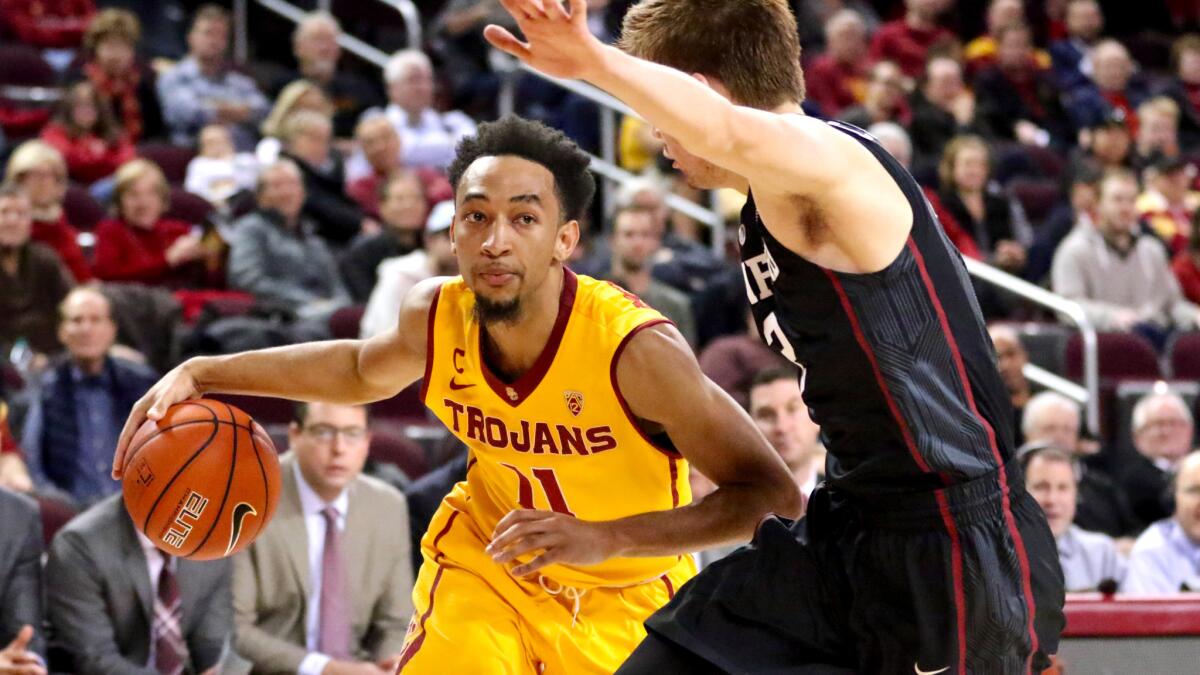
Jordan McLaughlin untucked his shirt and exhaled, as if he had just returned home after a long workday. There was no celebration at the final buzzer of No. 25 USC’s win over Stanford on Thursday despite the lopsided score, 72-56.
Players walked to the bench, filed through a handshake line and meandered through their usual lap around the Galen Center court.
The Trojans haven’t always played crisply as the late portion of the nonconference season transitioned into Pac-12 play. But they have continued to win.
Coach Andy Enfield’s 100th career win was less “Dunk City” than the utilitarian style that has become USC’s trademark, at least until forward Bennie Boatwright returns from a knee injury.
“We grind it out,” Enfield said. “We’ve been winning in different ways all year long.”
This game was never likely to be a shootout. Just about an hour before the tip, Stanford Coach Jerod Haase announced that forward Reid Travis would miss the game with a right shoulder injury. This was bad news for Stanford and for fans of scoring: Travis had led the team with 17.5 points and 9.6 rebounds per game. His absence defanged Stanford’s already docile offense. Just one other player, Dorian Pickens (13.2 points per game), averaged double-digit scoring.
What emerged was a game that looked as if it were being contested on ice. USC committed 18 turnovers. Stanford committed 21.
Stanford (8-7, 0-3 in the Pac-12) didn’t have a player in double figures until about six minutes remaining, when Marcus Allen finally broke through. He finished with 13 points. Pickens joined him there with about two minutes remaining. He also finished with 13 points.
Yet the Trojans led by just two points with two minutes remaining before halftime, until a brief spurt, capped by McLaughlin’s baseline-to-baseline buzzer-beating layup, gave USC a 36-28 lead at the break.
Despite the offensive woes, USC never lost control of the game. Stanford did not hold a lead. Guard De’Anthony Melton made two straight three-pointers from the top of the key with about five minutes remaining in the game to give USC a double-digit lead.
USC (15-1, 2-1) has clawed its way to its best start in 46 years despite the lack of style points. The Trojans have played only one top-25 team, No. 15 Oregon, which handed them a 23-point loss last week. But the Trojans have avoided any other letdowns.
USC doesn’t need to dominate. It needs only to hang on until Boatwright returns.
The Trojans outpaced their usual offensive output in the first few games after Boatwright’s injury. But that required all of its weapons to work in concert. If only one of the group of Elijah Stewart, McLaughlin or Chimezie Metu had an off day, USC sputtered. USC’s last three contests were three of its four lowest-scoring games of the season.
On Thursday, Metu had 14 points and 10 rebounds. McLaughlin scored 15 with six assists and Stewart had nine points and six rebounds.
Enfield has fiddled with his starting rotation to try to find the right recipe without Boatwright. Nick Rakocevic initially started in his place. Then Melton replaced Rakocevic in the starting rotation. On Thursday, Rakocevic returned, and guard Shaqquan Aaron sat early.
“You just have to try to find a rotation that’s working,” Enfield said. “Some nights are different than others. I can’t remember over the last seven or eight games the same five guys who have worked together.”
But USC has been adaptable.
“Coach Enfield’s pretty much known for his run-and-jump coaching style when he was at Florida Gulf Coast,” Metu said. “We kind of went away from it so far this season.”
Follow Zach Helfand on Twitter @zhelfand
Go beyond the scoreboard
Get the latest on L.A.'s teams in the daily Sports Report newsletter.
You may occasionally receive promotional content from the Los Angeles Times.

